Visual Explanation of SQL Joins
The most critical skill in working with a database is an understanding of the set of records returned by joining tables. It is rare to encounter a database in an enterprise application that consists of just one table. Extracting data from related tables is a critical skill for anyone working with databases.
We'll look at an example with two tables. The table on the left is named Table A and the table on the right is named Table B.
Each table will contain two columns, ID and Letter and 5 records. The data for the left table is A,B,C,D,E the data for the right table is D,E,F,G,H.
There are five ways to combine the data in these two tables. The same concepts apply when there are more tables.
- Inner Join
- Left Outer Join
- Right Outer Join
- Full Outer Join
- Cross Join
Inner Join
Returns all records that are in both Table A and Table B.
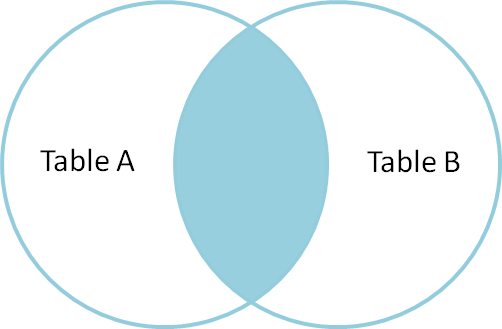
SELECT * FROM TableA
INNER JOIN TableB
ON TableA.name = TableB.name
id name id name
-- ---- -- ----
1 Pirate 2 Pirate
3 Ninja 4 Ninja
Left Outer Join
Returns all records in the left table, Table A and also all the records that are in Table B.
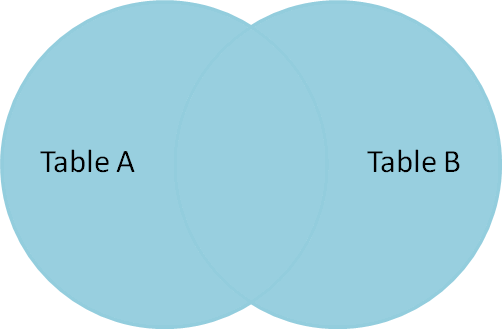
SELECT * FROM TableA FULL OUTER JOIN TableB ON TableA.name = TableB.name id name id name -- ---- -- ---- 1 Pirate 2 Pirate 2 Monkey null null 3 Ninja 4 Ninja 4 Spaghetti null null 5 Frujen null null null null 1 Rutabaga null null 3 Darth Vader null null 5 Han####Full outer join Returns a set that contains of all the records in ```Table A``` and ```Table B```. Records that both table have in common are also returned once. If ```Table B``` contains a record that is not in ```Table B``` then the missing value will contain '```null```.
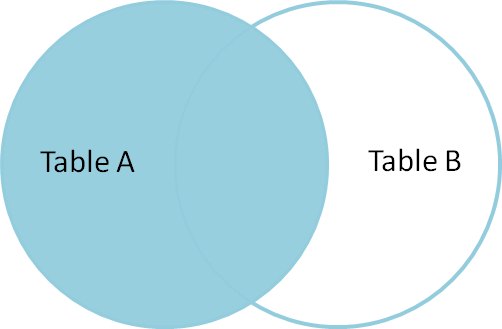
SELECT * FROM TableA LEFT OUTER JOIN TableB ON TableA.name = TableB.name id name id name -- ---- -- ---- 1 Pirate 2 Pirate 2 Monkey null null 3 Ninja 4 Ninja 4 Spaghetti null null 5 Frujen null null####Left outer join Returns a set that contains all the records from ```Table A``` along with the matching records (where available) from ```Table B```. Records in the left table only will contain ```null``` for the right side.
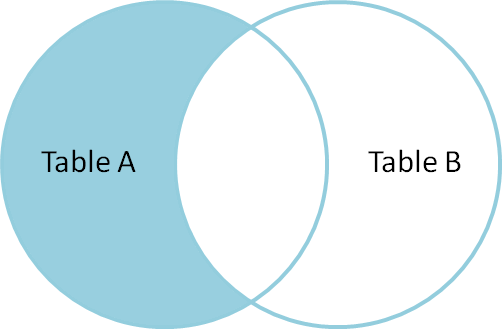
SELECT * FROM TableA LEFT OUTER JOIN TableB ON TableA.name = TableB.name WHERE TableB.id IS null id name id name -- ---- -- ---- 2 Monkey null null 4 Spaghetti null null 5 Frujen null null
To produce the set of records only in Table A, but not in Table B, we perform the same left outer join, then exclude the records we don't want from the right side via a where clause.
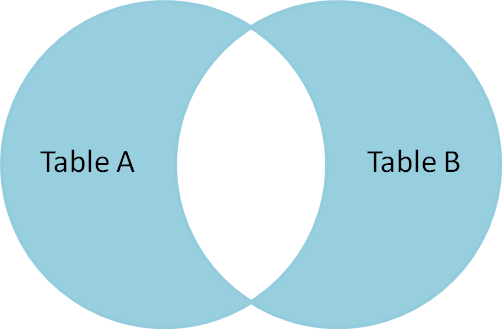
SELECT * FROM TableA FULL OUTER JOIN TableB ON TableA.name = TableB.name WHERE TableA.id IS null OR TableB.id IS null id name id name -- ---- -- ---- 2 Monkey null null 4 Spaghetti null null 5 Frujen null null null null 1 Rutabaga null null 3 Darth Vader null null 5 Han
To produce the set of records unique to Table A and Table B, we perform the same full outer join, then exclude the records we don't want from both sides via a where clause.